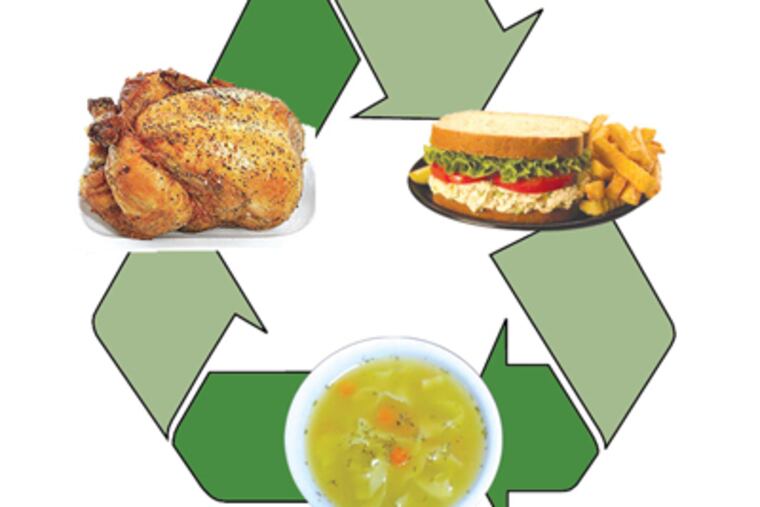GreenSpace: Disposing of the food-waste problem
Lucky me. I live with the Soup King. Back in the '60s, when my husband was a student at Abington High School, he took a boy chef class - yes, there are incriminating photos - and he's been improving on his techniques ever since.

Lucky me. I live with the Soup King.
Back in the '60s, when my husband was a student at Abington High School, he took a boy chef class - yes, there are incriminating photos - and he's been improving on his techniques ever since.
He polices the fridge with astonishing vigor. He can rescue some marginal ingredients and come up with a gustatory masterpiece.
He'll be finishing a stock made with a chicken carcass and never fail to say, "I can't believe people throw these away!" To him, a ham bone is a boon.
As for me, not only do I get a good meal, I also cross one more thing off my green-guilt list.
In a study published in November in the journal PLoS One, federal researcher Kevin D. Hall and colleagues concluded that per capita food waste in the United States, like the food itself, has supersized. It has increased by about 50 percent since 1974, now amounting to 1,400 calories per person per day.
Americans discard one quarter of the food they prepare from homes to restaurants.
So this isn't just an environmental issue. It touches on hunger and poverty.
Plus, it's not just the food. It's all the resources embedded in its production - the corn to feed the cow, the water that irrigates the crops.
At least institutional facilities and restaurants are getting more options. In November, an industrial-scale composting facility opened in Wilmington.
Households are mostly on their own. One 2006 study estimated that Americans throw away 14 percent of the food they buy - 470 pounds a year, which originally cost them $600.
Once again, all we have to do to be greener in this department is to look at what our forebears did during the Depression or other times when thrift was valued.
The U.S. Environmental Protection Agency has a hierarchy of uses for foodstuffs, and I was astonished when I read it to realize I'd actually been doing something right.
The first step is to buy more wisely. Plan ahead. Or, in my case, fail to plan. With an otherwise empty refrigerator, you'll simply have to eat the leftovers.
That segues into the EPA's next step, which is using excess to "feed hungry people." Larger operations can send it to food kitchens, but that's another story.
Next on the priority list is to give it to animals. I suppose the EPA is thinking not of household pets, but of livestock, like giving scraps to a farmer's pigs. My cats are all but useless in this regard anyway. Coco and Charlie will deign only to accept the odd bit of fish or meat.
But my backyard chickens are champs. They devour grains and greens as if it were chicken candy. Pizza crust, wilted parsley (why do they sell it in such big bunches anyway?), the tips of green beans - they scarf it down.
Naturally, not everyone wants to or can have chickens. But there's always Fido, even though veterinarians warn against giving dogs too many table scraps.
Last stop on my personal animal chain: the basement bin of worms, which seem to have a particular penchant for eggplant peelings.
Alas, I'm not too attentive to these poor creatures, so a few wrigglers have died. But I'm learning. Plenty of elementary-school kids have worm bins, so there's certainly hope for me.
And no, it doesn't stink, or my mother, who will laugh when she reads this, would surely have told me.
Next on the EPA's list is industrial uses - such as turning the fat into fuel or rendering it. Sorry, but I'm not going to go into soapmaking.
Finally, there's composting. I have two bins in the backyard. I'm not too scientific about this, either, because I really don't care when I get the goods - the rich compost - out of the bottom. But I've seen even city dwellers who were aces at composting.
The black gold goes back into the garden. To grow more ingredients for the Soup King.